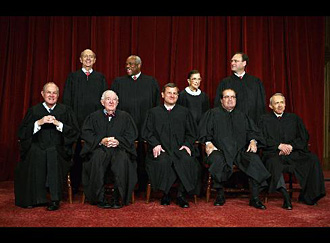
|
 |
 |
 News from Around the Americas | March 2008 News from Around the Americas | March 2008  
U.S. High Court Denies Hearing to Death Row Mexicans
 Greg Stohr - Bloomberg Greg Stohr - Bloomberg
go to original


| | The Justices of the United States Supreme Court pose for a group photograph at the Supreme Court in Washington, D.C., on March 3, 2006. Seated, from left, are: Justice Anthony M. Kennedy, Justice John Paul Stevens, Chief Justice John Roberts, Justice Antonin Scalia and Justice David Souter. Standing, from left, Justice Stephen G. Breyer, Justice Clarence Thomas, Justice Ruth Bader Ginsburg, and Justice Samuel Alito. (Dennis Brack/Bloomberg News) | | |
The U.S. Supreme Court ruled that Texas and other states don't have to grant new hearings to dozens of Mexicans who weren't told they could seek consular assistance upon arrest and are now on death row for murder.

The justices, voting 6-3, today refused to enforce a 2004 decision by the International Court of Justice, which said 51 Mexican nationals had been deprived of their rights and were entitled to a new hearing. The ruling is a victory for Texas, which said that under its criminal procedures the men weren't entitled to have their cases reconsidered.

"Not all international obligations automatically constitute binding federal law enforceable in United States courts," Chief Justice John Roberts wrote for the court.

The case tested the respective roles of the three American branches of government and the level of deference the U.S. should give to international tribunals. The fight found President George W. Bush's administration in an unusual position, arguing against his home state and in favor of expanded procedural rights for a group of convicted murderers.

The administration argued that the Supreme Court should defer to the president's conclusion, laid out in a memo to his attorney general, that Texas courts should give a new hearing to Jose Ernesto Medellin and other Mexican nationals.

Medellin's Rights

Texas officials contended that under state law, Medellin waived his right to argue about consular notification because he didn't raise the issue until his conviction and death sentence had been upheld on appeal. Texas said Bush was encroaching on the rights of states to enforce their own criminal-procedure rules.

A number of foreign governments, including Mexico and the European Union, filed briefs in the case urging the Supreme Court to order a new hearing for Medellin.

Justices Antonin Scalia, Clarence Thomas, Anthony Kennedy and Samuel Alito joined Roberts's opinion. Justice John Paul Stevens wrote separately to say he agreed with the outcome, though not all of Roberts's reasoning.

Roberts rejected contentions that three treaties signed by the U.S. obligated the country's state courts to comply with the World Court's judgment. The chief justice said that "none of these treaty sources creates binding federal law in the absence of implementing legislation."

Roberts added that the president can't "unilaterally" turn a treaty into binding domestic law.

"The responsibility for transforming an international obligation arising from a non-self-executing treaty into domestic law falls to Congress," he wrote.

Three Dissenters

Justices Stephen Breyer, Ruth Bader Ginsburg and David Souter dissented. Breyer said the ruling means "the nation may well break its word even though the president seeks to live up to that word and Congress has done nothing to suggest the contrary."

Stevens in his concurring opinion suggested that Texas, having won its case, should now grant hearings to the inmates.

"When the honor of the nation is balanced against the modest cost of compliance, Texas would do well to recognize that more is at stake" than the legal issues, Stevens wrote.

Article 36 of the Vienna Convention on Consular Relations requires government officials to immediately notify a detained foreign national of his right to seek assistance from his consulate.

Medellin was convicted in a Texas state court of taking part in the 1993 gang rape and murder of two teen-age girls in Houston. His lawyers argued that he wasn't aware of his consular rights during his trial and that Mexican authorities didn't learn of his detention until he wrote to them after his conviction was upheld in 1997.

Texas prosecutors said Medellin had the assistance of two court-appointed lawyers who opted not to seek consular help. The state also said he hasn't shown he was harmed by any violation of his rights.

The case is Medellin v. Texas, 06-984.

To contact the reporter on this story: Greg Stohr in Washington at gstohr(at)bloomberg.net. | 
 | |
 |



